2017年高考英语动词时态和语态知识点小结
高考英语语法知识点归纳总结:动词的时态和语态
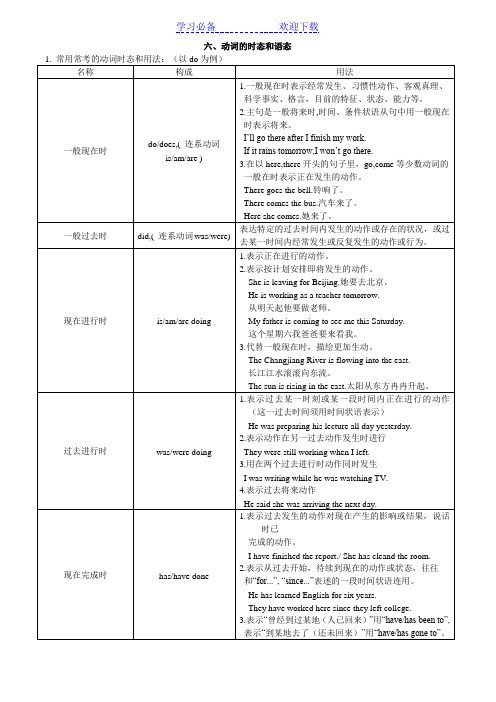
六、动词的时态和语态1. 常用常考的动词时态和用法:(以do为例)名称构成用法一般现在时do/does,( 连系动词is/am/are )1.一般现在时表示经常发生、习惯性动作、客观真理、科学事实、格言,目前的特征、状态、能力等。
2.主句是一般将来时,时间、条件状语从句中用一般现在时表示将来。
I’ll go there after I finish my work.If it rains tomorrow,I won’t go there.3.在以here,there开头的句子里,go,come等少数动词的一般在时表示正在发生的动作。
There goes the bell.铃响了。
There comes the bus.汽车来了。
Here she comes.她来了。
一般过去时did,( 连系动词was/were) 表达特定的过去时间内发生的动作或存在的状况,或过去某一时间内经常发生或反复发生的动作或行为。
现在进行时is/am/are doing 1.表示正在进行的动作。
2.表示按计划安排即将发生的动作。
She is leaving for Beijing.她要去北京。
He is working as a teacher tomorrow.从明天起他要做老师。
My father is coming to see me this Saturday.这个星期六我爸爸要来看我。
3.代替一般现在时,描绘更加生动。
The Changjiang River is flowing into the east.长江江水滚滚向东流。
The sun is rising in the east.太阳从东方冉冉升起。
过去进行时was/were doing 1.表示过去某一时刻或某一段时间内正在进行的动作(这一过去时间须用时间状语表示)He was preparing his lecture all day yesterday.2.表示动作在另一过去动作发生时进行They were still working when I left.3.用在两个过去进行时动作同时发生I was writing while he was watching TV.4.表示过去将来动作He said she was arriving the next day.现在完成时has/have done 1.表示过去发生的动作对现在产生的影响或结果,说话时已完成的动作。
完整版高考英语动词时态和语态讲解

时态语态〔一〕一般在表示:1.在的常性、性作 eg:IreadEnglisheverymorning.2.客真理、普遍公立、科学事eg:Thesunrisesintheeast.3.有的趣、好或能力eg:Helikesplayingfootball.4.存的性、特征或状eg:Thesituationisencouraging.5.介故事情、新eg:Workersfacetoughtimesabroad.6.按刻表或按定划、安排将要放生的作〔常如:come,go,leave,arrive,begin,start,takeoff,return,stop,open,close等〕eg:Thetrainleavesat4:30p.m.注意:here,there,now,then等开的倒装句要用一般在代替在行。
如:Look!Herecomesthebus.一般去表示:1.去常性、性的作或状eg:Heoftencriedwhenhewasaboy.2.去某的状或作eg:Iwenttothebankjustnow.3.用于Ididn’tknow⋯或Iforgot⋯,表示不知道或不得,但在道或得的事情。
eg:Ididn’tknowyouwerehere.Sorry,Iforgottobringmybook.注意:表示去常生的作,也可以用“usedtodo⋯〞和“woulddo〞一般将来表示: 1.在看来以后要生的作或存在的状eg:Tomwillcomenextweek.2.事物的固有属性或必然eg:Oilwillfloatinwater. Fishwilldiewithoutwater.3.将来某个作的安排、划eg:HeisgoingtospeakonTVthisevening.注意:将来常表达形式:will/shalldo;begoingtodo;betodo;beabouttodo 〔此形式不能与状用〕在行表示: 1.此此刻正在生的作eg:I’mstudyingEnglishnow.2.段正在生的作eg:Wearebuildingoursocialism.3.情况的性eg:Idon’treallyworkhere.Iamjusthelpinguntilthesecretaryarrives.4.与always,forever,constantly,continually 用,表示参上或等感情色彩,但并非作正在行eg:Heisalwayshelpingothers. Sheisalwaysforgettingsomething.5.按划、安排近期生的作〔只限于come,go,leave,arrive,start,move,sail,fly,travel,stay等〕eg:Aforeigneriscomingtovisitourschool. I’mleavingforBeijingtomorrow.注意:不宜用行的作:感:look,smell,feel,sound,taste,see,hear情感:like,love,prefer,admire, hate,fear 心:wish,hope,expect,want,need,believe,thin,understand,agree,know,remember,forget 所有:have,contain,won,hold,belongto去行表示: 1.去某一刻或段生的作eg:HewaswatchingTVthistimeyesterday.2.与always,forever,constantly,continually 用,表示或无等感情色彩eg:ComradeLei Fengwasalwaysthinkingofothersneverthinkingofhimself.3.去划、安排好的将来作〔只限于come,go,leave,arrive,start,move,sail,fly,travel,stay等〕eg:Hesaidhewasleavingthenextday. Iwastoldthetrainwasstartingsoon.注意:去行可用来描故事生的背景,如:Thewindwasblowinganditwasraininghard.去将来表示: 1.去某一刻后将要生的去作或去的意、打算〔主要用于从句中〕eg:She wassureshewouldsucceed. Ithoughtyouwouldcome.注意:把一般将来中的助成去式,便成了去将来的表达形式在完成表示: 1.在已完成或完成且在有影响的作eg:Ihavefinishedmyhomework.2.表示始于去持至今的作或状eg:He’slivedher esince2005. I’vetaughtEnglishfor15years.3.到目前止的一段内,多少次或第几次做某事eg:He’sbeentoBeijing severaltimes.It’sthethirdtimethatI’veseenthefilm.4.将来某将要做完的作〔限于和条件状从句〕eg:Don’tgetoffthebusuntilithas stopped.5.生在去的,但已成在的或eg:We’veallplayedwithsnowandice.注意:没有包括“在〞在内或不是截止到“在〞止的状不能与在完成用。
高考英语语法知识点归纳总结:动词的时态和语态

The sun is rising in the east. 太阳从东方冉冉升起。 1.表示过去某一时刻或某一段时间内正在进行的动作
(这一过去时间须用时间状语表示)
过去进行时
was/were doing
He was preparing his lecture all day yesterday. 2.表示动作在另一过去动作发生时进行
区别
例句
现在完成时强调过去动 作对现在产生的影响或 造成的结果
We haven ’ t heard from Jane for a long time. What do you sup
to her?
A. was happening B. happens
C. has happened D
说明:说话者强调 Jane 目前的状况 .
表示按计划进行或征求对方意见
时刻表上或日程安排上早就定好的事情, 示将来
可用一般现在时表
例句 He is moving to the south. Are they leaving for Europ I was about to leave when t The meeting is about to clo We’ re to meet at the sc noon. The meeting starts at five o The plane leaves at ten this
4.短暂动词(即瞬间动词), join,lose,buy,borrow,leave,go,come,arrive,die,marry, finish,complete,begin,start,break out 等,在完成时态 中,其肯定式不能和表示一段时间的状语连用。 不能说:
高中英语知识点归纳动词的时态与语态总结
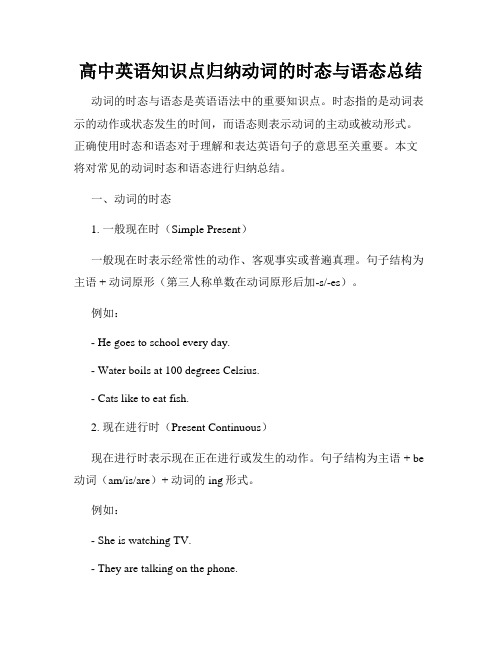
高中英语知识点归纳动词的时态与语态总结动词的时态与语态是英语语法中的重要知识点。
时态指的是动词表示的动作或状态发生的时间,而语态则表示动词的主动或被动形式。
正确使用时态和语态对于理解和表达英语句子的意思至关重要。
本文将对常见的动词时态和语态进行归纳总结。
一、动词的时态1. 一般现在时(Simple Present)一般现在时表示经常性的动作、客观事实或普遍真理。
句子结构为主语 + 动词原形(第三人称单数在动词原形后加-s/-es)。
例如:- He goes to school every day.- Water boils at 100 degrees Celsius.- Cats like to eat fish.2. 现在进行时(Present Continuous)现在进行时表示现在正在进行或发生的动作。
句子结构为主语 + be 动词(am/is/are)+ 动词的ing形式。
例如:- She is watching TV.- They are talking on the phone.- We are studying for the exam.3. 一般过去时(Simple Past)一般过去时表示发生在过去的动作或状态。
句子结构为主语 + 动词过去式。
例如:- I visited my grandparents last weekend.- He studied English in high school.- They went to the concert together.4. 过去进行时(Past Continuous)过去进行时表示过去某个时间点正在进行或发生的动作。
句子结构为主语 + was/were + 动词的ing形式。
例如:- She was cooking dinner when I called her.- They were playing soccer at the park yesterday.- We were watching a movie when the power went out.5. 一般将来时(Simple Future)一般将来时表示将来某个时间要发生的动作。
高考英语必考语法精讲精练专题八:动词的时态和语态 Word版含解析
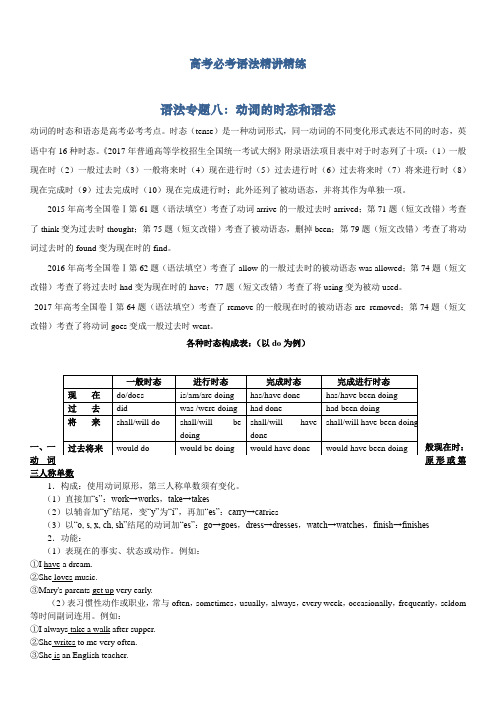
高考必考语法精讲精练语法专题八:动词的时态和语态动词的时态和语态是高考必考考点。
时态(tense)是一种动词形式,同一动词的不同变化形式表达不同的时态,英语中有16种时态。
《2017年普通高等学校招生全国统一考试大纲》附录语法项目表中对于时态列了十项:(1)一般现在时(2)一般过去时(3)一般将来时(4)现在进行时(5)过去进行时(6)过去将来时(7)将来进行时(8)现在完成时(9)过去完成时(10)现在完成进行时;此外还列了被动语态,并将其作为单独一项。
2015年高考全国卷Ⅰ第61题(语法填空)考查了动词arrive的一般过去时arrived;第71题(短文改错)考查了think变为过去时thought;第75题(短文改错)考查了被动语态,删掉been;第79题(短文改错)考查了将动词过去时的found变为现在时的find。
2016年高考全国卷Ⅰ第62题(语法填空)考查了allow的一般过去时的被动语态was allowed;第74题(短文改错)考查了将过去时had变为现在时的have;77题(短文改错)考查了将using变为被动used。
2017年高考全国卷Ⅰ第64题(语法填空)考查了remove的一般现在时的被动语态are removed;第74题(短文改错)考查了将动词goes变成一般过去时went。
各种时态构成表:(以do为例)一、一般现在时:动词原形或第三人称单数1.构成:使用动词原形,第三人称单数须有变化。
(1)直接加“s”:work→works,take→takes(2)以辅音加“y”结尾,变“y”为“i”,再加“es”:carry→car ries(3)以“o, s, x, ch, sh”结尾的动词加“es”:go→goes,dress→dresses,watch→watches,finish→finishes2.功能:(1)表现在的事实、状态或动作。
例如:①I have a dream.②She loves music.③Mary's parents get up very early.(2)表习惯性动作或职业,常与often,sometimes,usually,always,every week,occasionally,frequently,seldom 等时间副词连用。
高考英语时态语态知识点

高考英语时态语态知识点一、时态知识点1. 一般现在时一般现在时表示经常性或习惯性的动作、状态或客观真理等。
例句:Water boils at 100 degrees Celsius.2. 一般过去时一般过去时表示过去某个时间发生的动作或存在的状态。
例句:She lived in London for five years.3. 一般将来时一般将来时表示将来某个时间即将发生的动作或存在的状态。
例句:I will finish my homework tomorrow.4. 现在进行时现在进行时表示现在正在进行的动作。
例句:They are watching a movie right now.5. 过去进行时过去进行时表示过去某个时间正在进行的动作。
例句:She was studying when I called her.6. 将来进行时将来进行时表示将来某个时间正在进行的动作。
例句:This time next week, we will be traveling in Japan.7. 现在完成时现在完成时表示过去某个时间发生的动作对现在造成的影响或结果。
例句:I have finished my homework.8. 过去完成时过去完成时表示过去某个时间或动作之前已经发生的动作或存在的状态。
例句:She had already left when I arrived.9. 将来完成时将来完成时表示将来某个时间之前已经完成的动作或存在的状态。
例句:By this time tomorrow, I will have finished my report.二、语态知识点1. 主动语态主动语态表示主语是动作的执行者。
例句:She wrote a letter.2. 被动语态被动语态表示主语是动作的承受者,强调动作对主语的影响。
例句:The letter was written by her.3. 进行时的被动语态进行时的被动语态表示主语正在被动地进行某个动作。
2017年全国高考英语真题分类汇编---时态语态及动词词义辨析解析
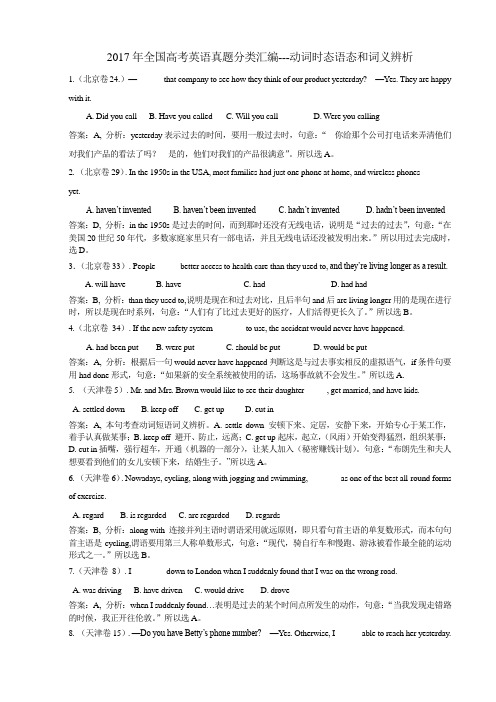
2017年全国高考英语真题分类汇编---动词时态语态和词义辨析1. (北京卷24.)—______ that company to see how they think of our product yesterday? —Yes. They are happy with it.A. Did you callB. Have you calledC. Will you callD. Were you calling答案:A, 分析:yesterday表示过去的时间,要用一般过去时,句意:“---你给那个公司打电话来弄清他们对我们产品的看法了吗?---是的,他们对我们的产品很满意”。
所以选A。
2. (北京卷29). In the 1950s in the USA, most families had just one phone at home, and wireless phones _______ yet.A. haven’t inventedB. haven’t been inventedC. hadn’t inventedD. hadn’t been invented答案:D, 分析:in the 1950s是过去的时间,而到那时还没有无线电话,说明是“过去的过去”,句意:“在美国20世纪50年代,多数家庭家里只有一部电话,并且无线电话还没被发明出来。
”所以用过去完成时,选D。
3.(北京卷33). People______better access to health care than they used to, and they’re living longer as a result.A. will haveB. haveC. hadD. had had答案:B, 分析:than they used to,说明是现在和过去对比,且后半句and后are living longer用的是现在进行时,所以是现在时系列,句意:“人们有了比过去更好的医疗,人们活得更长久了。
高中英语知识点归纳动词的时态与语态
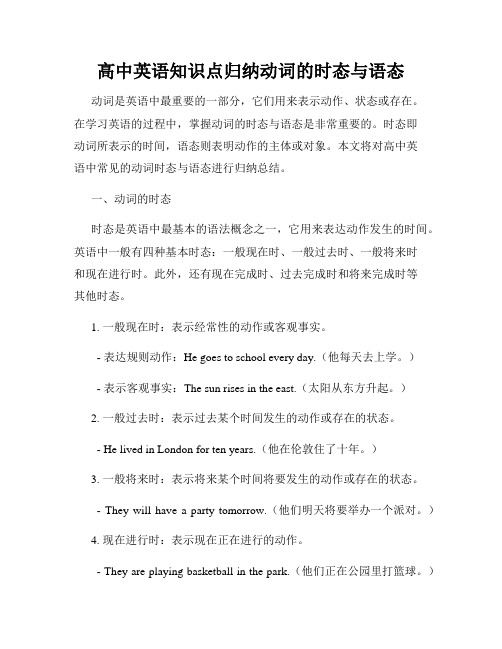
高中英语知识点归纳动词的时态与语态动词是英语中最重要的一部分,它们用来表示动作、状态或存在。
在学习英语的过程中,掌握动词的时态与语态是非常重要的。
时态即动词所表示的时间,语态则表明动作的主体或对象。
本文将对高中英语中常见的动词时态与语态进行归纳总结。
一、动词的时态时态是英语中最基本的语法概念之一,它用来表达动作发生的时间。
英语中一般有四种基本时态:一般现在时、一般过去时、一般将来时和现在进行时。
此外,还有现在完成时、过去完成时和将来完成时等其他时态。
1. 一般现在时:表示经常性的动作或客观事实。
- 表达规则动作:He goes to school every day.(他每天去上学。
)- 表示客观事实:The sun rises in the east.(太阳从东方升起。
)2. 一般过去时:表示过去某个时间发生的动作或存在的状态。
- He lived in London for ten years.(他在伦敦住了十年。
)3. 一般将来时:表示将来某个时间将要发生的动作或存在的状态。
- They will have a party tomorrow.(他们明天将要举办一个派对。
)4. 现在进行时:表示现在正在进行的动作。
- They are playing basketball in the park.(他们正在公园里打篮球。
)5. 现在完成时:表示过去某个时间开始的动作一直持续到现在,或者强调过去的动作对现在造成的影响。
- I have finished my homework.(我已经完成了作业。
)6. 过去完成时:表示过去某个时间之前已经发生的动作。
- He had already left when I arrived.(我到达时他已经离开了。
)7. 将来完成时:表示将来某个时间之前已经完成的动作。
- By this time next year, I will have graduated from university.(到明年这个时候,我将已经大学毕业了。
- 1、下载文档前请自行甄别文档内容的完整性,平台不提供额外的编辑、内容补充、找答案等附加服务。
- 2、"仅部分预览"的文档,不可在线预览部分如存在完整性等问题,可反馈申请退款(可完整预览的文档不适用该条件!)。
- 3、如文档侵犯您的权益,请联系客服反馈,我们会尽快为您处理(人工客服工作时间:9:00-18:30)。
2017年高考英语动词时态和语态知识点总结动词的时态和语态是历年高考英语测试的重中之重,一般占1—2道题。
命题思路有三:一是直接给出标志性时间状语,考生能依据所给时间状语作出选择;二是给出时间状语,但所给时间状语有着较强的干扰性,考生不能直接根据时间状语作出选择,需要结合语境判断;三是没有任何时间状语,需要借助于上下文语境,才能作出正确判断。
考生应熟知常用时态和被动语态的构成及用法。
高考题往往不会涉及单一的时态语态,而是更多地侧重于时态的交叉使用和呼应及与语态的结合使用。
所以解题时一定要结合语境,弄清时间的先后关系,可根据不同情况采取“找标法”(寻找时间标志词)、“呼应法”(主从句时态呼应)、“搭配法”(固定搭配)、“语境法”等解题技巧。
一?识别标志词如果题干中有标志性的时间状语,则往往可以根据时间状语选择相应的时态?[例]①More than a dozen students in that school ________ abroad to study medicine last year.A. sentB. were sentC. had sentD. had been sent[解析] 此题有明显的时间标志词last year,提示我们应该使用一般过去时;句中的主语students是被送的对象,应该使用被动语态?答案为B?动词的时态一般都有其相应的时间状语,请同学们熟记下列8种常用时态所对应的时间状语?(1)一般现在时:often, always, usually, seldom, now, every day等?(2)一般过去时:then, yesterday, last week, after that, ago, in the following/next few months等?(3)现在进行时:now, right now, at present, at this moment, these days等?(4)过去进行时:then, at that time, at this time yesterday等?(5)现在完成时: recently, lately, up to/till now, so far, in the past/last few months/years…, for+一段时间,since + 一点时间等?(6)过去完成时:before, b y the end of last month/years…等?(7)一般将来时:tomorrow, today, next week/month…, in an hour, in the ing/following few weeks等?(8)过去将来时:the following month, the next week等?[命题角度及对策]高考测试动词时态须与句中时间状语一致时,常在题干中加入具体情景,以测试考生对动词时态知识的实际运用能力?敏锐捕捉时间标志词,并结合具体的语境,选择出正确的动词时态,是解决此类问题的良策?二?主从时态须呼应如果所给题干是主从复合句,可根据主从句时态呼应的原则选出正确的时态?命题角度及对策]近年来高考考查主从句的时态呼应时,常放在真实的并且符合实际的语境中进行考查?在根据时态呼应原则解题时,要把握好以下几点:(1)在时间?条件等状语从句中,用一般现在时表示一般将来时,一般过去时表示过去将来时,用现在完成时表示将来完成时?(2)正确认定主句动词及从句动词两个动作发生的时间,并认真体会命题者所给出的语境?(3)解答宾语从句与主句时态呼应题时,考生应熟知以下规则:主句动词为现在时,则从句动词可根据需要使用任何时态;主句动词为过去时,则从句动词须用恰当的过去的某种时态(表示客观真理时使用一般现在时)?三?仔细体会语境>近年来高考试题对时态语态考查的要求越来越高,大部分试题趋向情境化?实际化?因此,仔细体会所给语境,根据具体语境选择合适的时态是考生需要重点解决的问题?例:—Do you think we should accept that offer?—Yes,we should,for we______ such bad luck up till now,and time______ out.A. have had;is runningB. had;is runningC. have;has been runD. have had;has been run【答案解析】 A。
由时间标志词up till now知道,动作是从过去延续到现在,所以第一空要用现在完成时;而根据语境可知时间快要耗光了,所以第二空要用进行时表将来。
—Can you tell me the timetable of the__________school bus?—Well, the bus__________here for the __________campus at 7:00 A.mA.will leaveB.leftC.is leavingD.leaves【答案解析】 D。
考查时态,“校班车的时间表”是规定好的事情,表示一般性动作用一般现在时。
【精选试题】名校模拟题及其答案1. —What’s that terrible noise ?— The neighbors _____ for a party.A. have preparedB. are preparingC. prepareD. will prepare2. Now that she is out of a job, Lucy _____ going back to school, but she hasn’t decided yet.A. had consideredB. has been consideringC. has been pletedD. is going to consider3. The mayor of Beijing says that all construction work for the Beijing Olympics _____ by 20**.A. has been pletedB. has pletedC. will have been pletedD. will have pleted4. Selecting a mobile phone for personal use is no easy task because technology ____ so rapidly.A. is changingB. has changedC. will have changedD. will change5. I _____ Ping –pong quite well, but I haven’t hadtime to play since the new year.A. playedB. will playC. have playedD. play6. Visitors ______ not to touch the exhibits.A. will requestB. requestC. are requestingD. are requested7. John and I _____ friends for eight years. We first got to know each other at a Christmas party. But we _____ each other a couple of times before that.A. had been; have seenB. have been; have seenC. had been; had seenD. have been; had seen8. This is Ted’s photo. We miss him a lot. He ______ trying to save a child in the earthquake.A. killedB. is killedC. was killedD. was killing9. — How are the team playing ?— They are playing well, but one of them _____ hurt.A. gotB. getsC. areD. were10. —You haven’t said a word about my new coua, Brenda. Do you like it ?—I’m sorry, I _____ anything about it sooner. I certainly think it’s pretty on you.A. wasn’t sayingB. don’t sayC. won’t sayD. didn’t say11. I wonder why Jenny ____ us recently. We should have heard from her by now.A. hasn’t writtenB. doesn’t writeC. won’t writeD. hadn’t written12. My uncle ______ until he was forty –five.A. marriedB. didn’t marryC. was not marryingD. would marry13. — When will you e to see me, Dad ?— I will go to see you when you _____ the training course.A. will have finishedB. will finishC. are finishingD. finish14. — How long _____ at this job ?— Since 1990A. were you cmployedB. have you been employedC. had you been employedD. will you be employed15. With the rapid growth of population, the city _____ in all directions in the past five years.A. spreadsB. has spreadC. spreadD. had spread16. The silence of the library _____ only by the sound of pages being turned over.A. has been brokenB. breaksC. brokeD. was broken17. All morning as she waited for the medical report from the doctor, her nervousness _____.A. has grownB. is growingC. grewD. had grown18. Why don’t you put the meat in the fridge ? It will _____ fresh for several days.A. be stayedB. stayC. be stayingD. have stayed19. —Sorry, Joe, I didn’t mean to—Don’t call me “Joe”。
